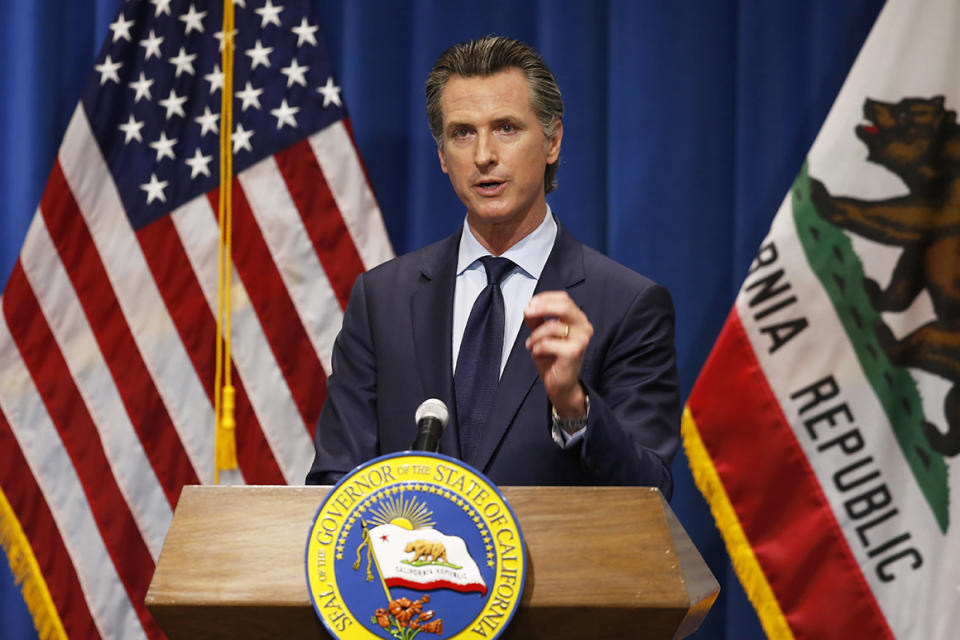States battle churches’ lockdown challenges at SCOTUS
The governors of Illinois and California took somewhat different tacks Thursday night as they urged the Supreme Court not to get involved in disputes over the impact of virus-related lockdown orders on churches in their states.
Hours before a deadline to respond to two churches’ request for an emergency stay to allow them to have more than 10 people in attendance at Pentecost services this Sunday, Gov. J.B. Pritzker (D-Ill.) announced that he was dropping all legal restrictions on religious gatherings and replacing them with voluntary “guidance.”
The new guidelines encourage congregations to limit attendance to 25 percent of normal capacity with no more than 100 people on hand.
“Per the Governor’s announcement today, religious organizations are no longer subject to any of the gathering restrictions in any phase,” Illinois Attorney General Kwame Raoul and Solicitor General Jane Notz wrote in the state’s submission to the Supreme Court on Thursday night.
By contrast, California's Democratic Gov. Gavin Newsom’s most recent virus-response plan includes the same numerical standards for churches, but makes the limits mandatory rather than optional.

Both states defended their prior actions and, notably, declined to promise not to reimpose more aggressive measures, if warranted.
“When the attendance restriction proves unnecessary, the State will lift it or loosen it,” California Attorney General Xavier Becerra and Solicitor General Michael Mongan wrote in the state’s filing with the justices. “In light of the tremendous uncertainty continuing to surround this new and deadly virus, however, it would be rash to do so today, before public-health officials have had the opportunity to evaluate evidence of the policy’s effectiveness in practice.”
A lawyer for the two Chicago-area churches challenging the Illinois policy, Mat Staver, said Pritzker’s last-minute shift showed his earlier directive was unjustified.
“The fact that he recently said that churches would never get above 50 people for at least 12 to 18 months, and now a few hours before he had to file with the Supreme Court he removes all restrictions, illustrates that he had no basis for the orders in the first place,” said Staver, founder of Liberty Counsel. “The only thing that changed was he was dragged to the steps of the U.S. Supreme Court.”
While the churches have argued that the states’ rules have treated them worse than big box stores or offices, the states rejected that claim Thursday, insisting that the restrictions on religious worship were prompted by compelling evidence that such services pose an unusually serious risk of transmitting the virus.
“Unfortunately, the reality is that, given the close quarters and verbal interactions involved in such gatherings, outbreaks of the virus have been traced back to religious services around the world,” the Illinois state lawyers wrote.
Attorneys for both states pointed to a slew of significant infections traced to churches, including in California, Kentucky, Washington state, Germany and South Korea.
President Donald Trump jumped into the fray last week, announcing — without citing any legal authority — that he was ordering states to declare religious worship at churches, synagogues and mosques to be “essential” under states’ coronavirus lockdown plans.
However, lawyers for both Pritzker and Newsom said they had already labeled churches as “essential” and made accommodations from early in the outbreak, such as allowing travel by ministers and drive-in church services.
The Illinois churches struck out in their efforts to seek emergency relief from Pritzker’s earlier orders. A 7th Circuit Court of Appeals panel turned down a request for an injunction earlier this month.
Chicago authorities sent the pastor of one of the churches a notice last week saying that by defying the ban his church could be deemed a public nuisance subject to “summary abatement,” which can involve demolition. However, the city has said it has no plans to knock down churches “in any fashion.”
The San Diego-area church challenging Newsom’s order also came up short in court, but did get one 9th Circuit judge to dissent as two of his colleagues refused to grant an emergency stay.
“I do not doubt the importance of the public health objectives that the State puts forth, but the State can accomplish those objectives without resorting to its current inflexible and over-broad ban on religious services,” wrote Judge Daniel Collins, a Trump appointee. (The state subsequently relaxed those restrictions.)
Other federal appeals courts have agreed to churches’ requests to block lockdown orders in Mississippi and Kentucky.
Both California and Illinois are suggesting to the justices that wading into the quickly changing array of virus-related orders would be unwise, as infection rates fluctuate and authorities try to tailor their responses accordingly.
“It would surely be premature to assess whether a hypothetical future pandemic response would be constitutionally justified without knowing the circumstances that prompted its adoption,” the California lawyers wrote.
There is no deadline for the high court to act on the emergency applications. However, some action is expected before Sunday, given the churches' request to hold larger holiday services. The emergency relief the churches are seeking typically requires the support of five of the court's nine justices.
